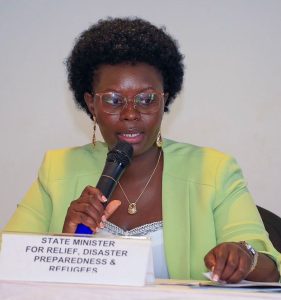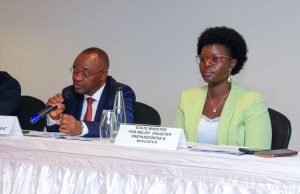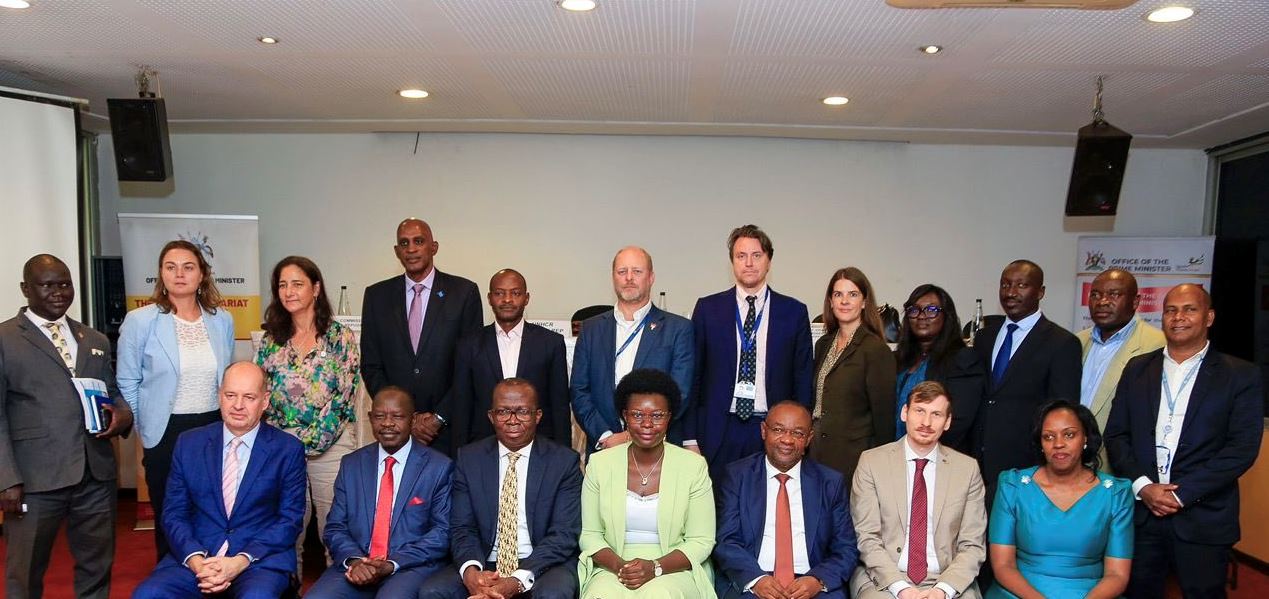By: Hellen Namale
KAMPALA
The Refugee Steering Group has, during its 22nd sitting, admitted the Intergovernmental Authority on Development (IGAD) as a member. IGAD, which assists and complements efforts of member states to achieve food security, environmental protection, peace and security, economic cooperation and integration in the region, was until 19th September 2024 attending the group meetings as an observer.
“We are truly humbled and highly honoured to be received as a new member of the Uganda National CRRF Steering Group where we previously attended as observers,” said Ndahiriwe Innocent, the IGAD Country Coordinator during the meeting that took place at Kabira Country Club Kampala.
Hon. Magyezi Raphael, the Minister of Local Government who represented the Hon. Hilary Onek, the Minister of Relief, Disaster Preparedness and Refugees acted as the Chairperson at the 22nd Comprehensive Refugee Response Forum (CRRF) steering group meeting.
Hon. Lilian Aber, the State Minister of Relief, Disaster Preparedness and Refugees, who was the co-chair used the event to appreciate donors and partners in refugee response saying the country will maintain its open door policy.

Hon. Lillian Aber, Minister of State for Relief, Disaster Preparedness and Refugees making a submission during the Steering Group Meeting
“Adapting this multi-stakeholder approach will hasten our efforts to attain sustainable and durable solutions to the protracted refugee crises we are currently facing. I appreciate efforts from all Donors and partners in refugee response as we continue to follow up on the pledges at the Global Refugee Forum (GRF). Uganda remains committed to her open door policy,” she said.
Hon. Raphael Magyezi remarked that Uganda’s refugee crisis had reached a critical point, with numbers swelling from 1.4m to 1.7million, while funding dwindles. “The situation is dire, with overcrowding, resource scarcity and environmental degradation threatening the well-being of both refugees and host communities,” said Magyezi.
“Uganda, known for its open door policy, is shouldering a significant burden. The country hosts the largest number of refugees in Africa and the third-largest globally. The majority of refugees are from South Sudan, Democratic Republic of Congo, Somalia, Rwanda, Eritrea and Burundi. Despite efforts to integrate refugees into the National Development Plans, the strain on resources is evident,” added Magyezi who emphasized the need for sustainable solutions, increased funding and international support saying; “Uganda’s generosity should not come at the expense of its own development and stability.”
According to Mathew Crentsil, UNHCR Country Representative, the country is seeing significant influx of refugees compared to other nations, with 80% being women and children. To address the issue of long staying of refugees, Crentsil revealed that the Ugandan government and UNHCR were working together to provide sustainable solutions.
Crentsil emphasized that refugees are expected to abide by the law like any other citizens and efforts are being made to support their integration into local communities.

Minister for Local Government Hon. Raphael Magyezi (left) flacked by Minister of State for Relief, Disaster Preparedness and Refugees Hon. Dr. Lillian Aber
“In 2018, partners did not fully engage with the program, but as per now things have changed and they have started getting involved, the pledges made have helped focus attention on the refugee response but more support is needed to address the needs of refugees,” he said.
Hellen Bugaari, the Director CRRF secretariat, highlighted the challenges in tracking pledges made to support refugees in Uganda. She emphasized the importance of collective effort in addressing these challenges, stating that together; “we can achieve more in the monitoring progress.”
“The government has demonstrated its commitment to supporting refugees, with Ministers publicly declaring their pledges, additionally the government has issued birth certificates to children in the refugee settlements, ensuring their access to essential services,” she added.
The Commissioner for Refugees under the Office of the Prime Minister, Mr. Patrick Okello expressed his gratitude and confidence over the progress made in supporting refugees in Uganda following the regulatory impact assessment that was conducted in March.
“In July, stakeholders validated the assessment and their comments are being integrated into the support plan, said Okello. However, he called for additional funding as the initial funds from the IGAD were exhausted.”
END





